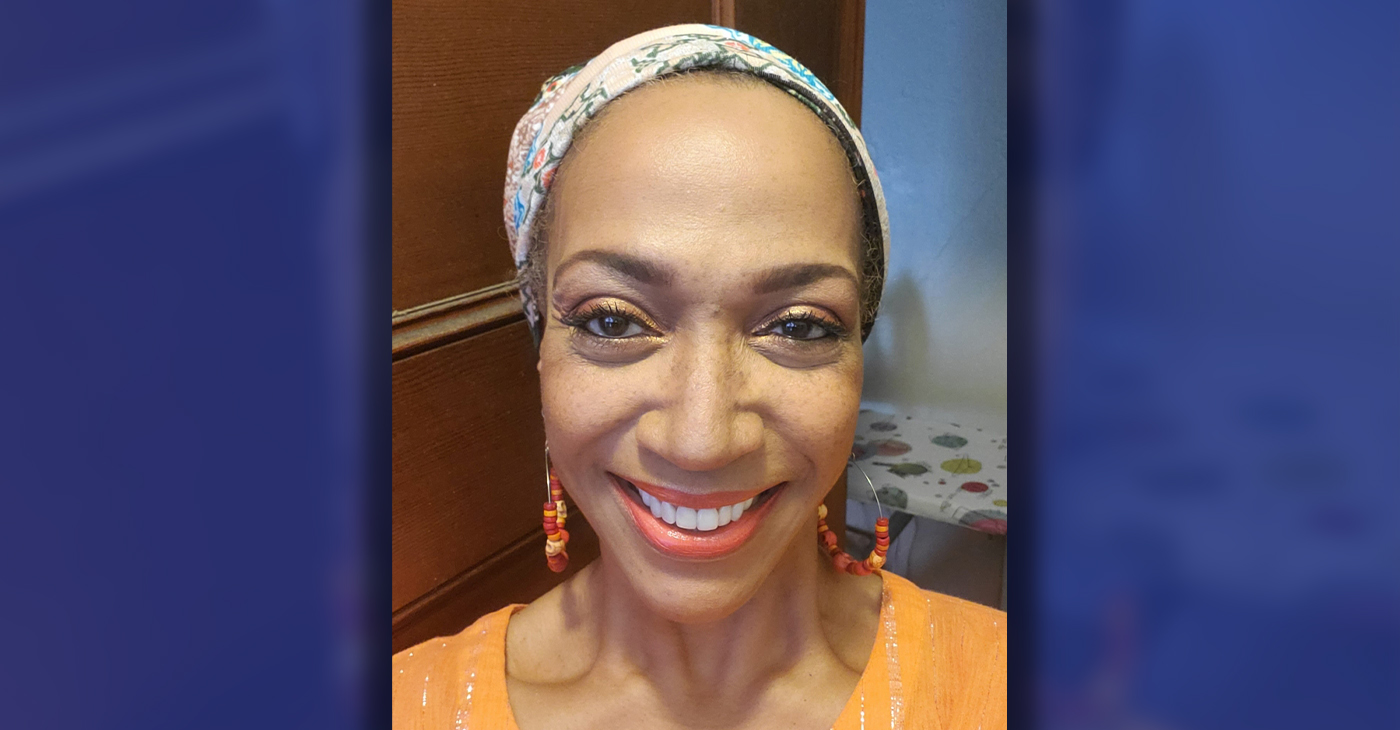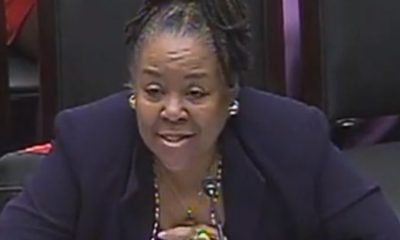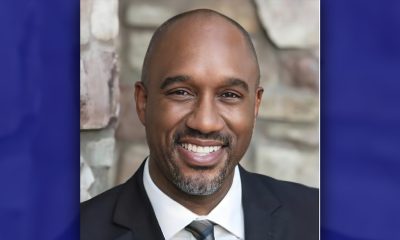Arts and Culture
Golden Globe Awards Blackout — Travesty or Testament?

Many cultural critics and pundits were in an uproar over the shutout of Black talent at the 2020 Golden Globe Awards held Jan. 5, 2020.
The Golden Globes are voted on by the Hollywood Foreign Press, which is a non-profit organization composed of journalists, photographers and media professionals who report on the entertainment industry.
Last year, actress/director Regina King took home a Golden Globe for Best Performance by an Actress in a Supporting Role for “If Beale Street Could Talk” and Best Performance by an Actress in a Limited Series or Motion Picture Made for Television for “Seven Seconds” (Netflix).
Mahershala Ali won for Best Performance by an actor in a Motion Picture for “Green Book” in 2019.
These were the awards despite the tremendous amount of Black talent on and off-screen in 2019 in major motion pictures like “Black Panther,” “BlacKKKlansman” and a litany of amazing performances in front of and behind the small screen on network and cable television.
Black folks fared even worse at the 2020 Golden Globes, not taking home one statue, even with compelling television and film like “The Last Black Man in San Francisco” (A24), “Black and Blue” (Screen Gems), “Queen & Slim,”(BRON Studios) “Raising Dion” (Netflix), “American Gods” (Starz) , “Southside” (Comedy Central), “Pose” (F/X), “Dear White People” (Netflix), “Claws” (TNT), “Snowfall” (F/X) and “When They See Us” (Netflix), not to mention outstanding web series like “Giants” and “Pillow Talk.”
Suffice it to say the Golden Globes still aren’t feeling Black talent, so why are audiences so invested in this show and others?
Black talent being shut out of the Golden Globes is not just a travesty but also a testament to the power of the work and the narratives being told that challenge the status quo. Why folks assume that awards shows invested in the same media industries that continue to perpetuate and recycle the vilest stereotypes of Black identity and behavior would somehow acknowledge the stories, performances and behind-the-scenes work that challenges dominant ways of thinking about Black people on and off-screen is befuddling.
Black folks aren’t the only historically marginalized group snubbed by the Golden Globes. No women directors were nominated for any directing awards this year.
Only five women have ever been nominated for directing in the 77-year history of the Golden Globes. Most recently was Ava DuVernay (Selma) in 2015; Barbra Streisand (“Yentl” and “The Prince of Tides”), Jane Campion (“The Piano”), Sofia Coppola (“Lost in Translation”) and Kathryn Bigelow (“The Hurt Locker” and “Zero Dark Thirty”). How is it possible for Greta Gerwig (“Little Women”) and Lulu Wang (“The Farewell”) and Ava DuVernay (“When They See Us”) to not be nominated this year?
It is entirely possible in an industry that has yet to catch up to a century of overlooking and further marginalizing members of historically disenfranchised groups. There is a reason Black showrunners and filmmakers like Shonda Rhimes and Kenya Barris are moving to Netflix. They want to tell compelling stories and have power over final edits that don’t dilute the power of their prose by elevating the feelings and needs of white viewers over all others.
According to the University of Southern California’s “Inclusion in the Director’s Chair Study,” only 4.9% of top films were directed by women in Hollywood from 2007-2019. Twenty percent of Netflix’s 53 U.S. films was directed by women in 2019. Of the 4.9% of women directors in Hollywood, less than 1% were directed by women of color.
Netflix has also aggressively diversified its staff to reflect the changing demographics of society, while Hollywood slowly makes hiring changes through pipeline programs with abysmal full-time job conversions.
“The Farewell” actress Awkwafina made Golden Globes history by becoming the first performer of Asian descent to win a Golden Globe award in a lead actress in a musical or comedy, which is a triumph in some ways, but could also be considered a travesty with the amount of influential and amazing work that has come from people of Asian descent on-screen and off-screen in the United States and abroad.
Historically, the Golden Globes and similar award shows have not been good at identifying, acknowledging or rewarding black talent, much like the entertainment industries themselves.
Change is slow but sure, but there is no need to be a glutton for punishment. Tune into the NAACP Image Awards, the African American Film Critics Association Awards and the BET Awards if you want to see a greater representation and acknowledgement of black talent in the entertainment industry that is actually celebrated and rewarded.
This article was written by Nsenga K. Burton, Ph.D., entertainment and culture editor for NNPA/Black Press USA. Nsenga is also founder & editor-in-chief of the award-winning news blog The Burton Wire, which covers news of the African Diaspora. Follow her on Twitter @Ntellectual.
Activism
OPINION: “My Girl,” The Temptations, and Nikki Giovanni
Giovanni was probably one of the most famous young African American women in the 1960s, known for her fiery poetry. But even that description is tame. The New York Times obit headline practically buried her historical impact: “Nikki Giovanni, Poet Who Wrote of Black Joy, Dies at 81.” That doesn’t begin to touch the fire of Giovanni’s work through her lifetime.

By Emil Guillermo
The Temptations, the harmonizing, singing dancing man-group of your OG youth, were on “The Today Show,” earlier this week.
There were some new members, no David Ruffin. But Otis Williams, 83, was there still crooning and preening, leading the group’s 60th anniversary performance of “My Girl.”
When I first heard “My Girl,” I got it.
I was 9 and had a crush on Julie Satterfield, with the braided ponytails in my catechism class. Unfortunately, she did not become my girl.
But that song was always a special bridge in my life. In college, I was a member of a practically all-White, all-male club that mirrored the demographics at that university. At the parties, the song of choice was “My Girl.”
Which is odd, because the party was 98% men.
The organization is a little better now, with women, people of color and LGBTQ+, but back in the 70s, the Tempts music was the only thing that integrated that club.
POETRY’S “MY GIRL”
The song’s anniversary took me by surprise. But not as much as the death of Nikki Giovanni.
Giovanni was probably one of the most famous young African American women in the 1960s, known for her fiery poetry. But even that description is tame.
The New York Times obit headline practically buried her historical impact: “Nikki Giovanni, Poet Who Wrote of Black Joy, Dies at 81.”
That doesn’t begin to touch the fire of Giovanni’s work through her lifetime.
I’ll always see her as the Black female voice that broke through the silence of good enough. In 1968, when cities were burning all across America, Giovanni was the militant female voice of a revolution.
Her “The True Import of Present Dialogue: Black vs. Negro,” is the historical record of racial anger as literature from the opening lines.
It reads profane and violent, shockingly so then. These days, it may seem tamer than rap music.
But it’s jarring and pulls no punches. It protests Vietnam, and what Black men were asked to do for their country.
“We kill in Viet Nam,” she wrote. “We kill for UN & NATO & SEATO & US.”
Written in 1968, it was a poem that spoke to the militancy and activism of the times. And she explained herself in a follow up, “My Poem.”
“I am 25 years old, Black female poet,” she wrote referring to her earlier controversial poem. “If they kill me. It won’t stop the revolution.”
Giovanni wrote more poetry and children’s books. She taught at Rutgers, then later Virginia Tech where she followed her fellow professor who would become her spouse, Virginia C. Fowler.
Since Giovanni’s death, I’ve read through her poetry, from what made her famous, to her later poems that revealed her humanity and compassion for all of life.
In “Allowables,” she writes of finding a spider on a book, then killing it.
And she scared me
And I smashed her
I don’t think
I’m allowed
To kill something
Because I am
Frightened
For Giovanni, her soul was in her poetry, and the revolution was her evolution.
About the Author
Emil Guillermo is a journalist, commentator, and solo performer. Join him at www.patreon.com/emilamok
Activism
Books for Ghana
We effectively facilitated cross-continent community building! We met the call and provided 400 books for ASC’s students at the call of the Minister of Education. We supported the work of a new African writer whose breakout novel is an action-packed depiction of a young woman steeped in Ghanaian culture who travels to the USA for college, all the while experiencing the twists, turns, and uncertainties that life brings.

By Min. Rauna Thurston, Chief Mpuntuhene Afua Ewusiwa I
My travels to Afrika began in June 2022, on a tour led by Prof. Manu Ampim, Director of the organization Advancing The Research. I was scheduled to become an ordained Minister by Wo’se Community of the Sacred African Way. It was vital that my feet touch the soil of Kemet and my spirit connect with the continent’s people before ordination.
Since 2022, I’ve made six trips to Afrika. During my travels, I became a benefactor to Abeadze State College (ASC) in Abeadze Dominase, Ghana, originally founded by Daasebre Kwebu Ewusi VII, Paramount Chief of Abeadze Traditional Area and now run by the government. The students there were having trouble with English courses, which are mandatory. The Ghanaian Minister of Education endorsed a novel written by 18-year-old female Ghanaian first-time writer, Nhyira Esaaba Essel, titled Black Queen Sceptre. The idea was that if the students had something more interesting to read, it would evoke a passion for reading; this seemed reasonable to me. Offer students something exciting and imaginative, combined with instructors committed to their success and this could work.
The challenge is how to acquire 800 books?!
I was finishing another project for ASC, so my cash was thin and I was devoid of time to apply for annual grants. I sat on my porch in West Oakland, as I often do, when I’m feeling for and connecting to my ancestors. On quiet nights, I reminisce about the neighborhood I grew up in. Across the street from my house was the house that my Godfather, Baba Dr. Wade Nobles and family lived in, which later became The Institute for the Advanced Study of Black Family Life & Culture (IASBFLC). Then, it came to me…ancestors invited me to reach out to The Association of Black Psychologists – Bay Area Chapter (ABPsi-Bay Area)! It was a long shot but worth it!
I was granted an audience with the local ABPsi Board, who ultimately approved funding for the book project with a stipulation that the Board read the book and a request to subsequently offer input as to how the book would be implemented at ASC. In this moment, my memory jet set to my first ABPsi convention around 2002, while working for IASBFLC. Returning to the present, I thought, “They like to think because it feels good, and then, they talk about what to do about what they think about.” I’m doomed.
However, I came to understand why reading the book and offering suggestions for implementation were essential. In short: ABPsi is an organization that operates from the aspirational principles of Ma’at with aims of liberating the Afrikan Mind, empowering the Afrikan character, and enlivening: illuminating the Afrikan spirit. Their request resulted in a rollout of 400 books in a pair-share system. Students checked out books in pairs, thereby reducing our bottom line to half of the original cost because we purchased 50% fewer units. This nuance promoted an environment of Ujima (collective work & responsibility) and traditional Afrikan principles of cooperation and interdependence. The student’s collaborative approach encouraged shared responsibility, not only for the physical book but for each other’s success. This concept was Dr. Lawford Goddard’s, approved by the Board, with Dr. Patricia “Karabo” Nunley at the helm.
We effectively facilitated cross-continent community building! We met the call and provided 400 books for ASC’s students at the call of the Minister of Education. We supported the work of a new African writer whose breakout novel is an action-packed depiction of a young woman steeped in Ghanaian culture who travels to the USA for college, all the while experiencing the twists, turns, and uncertainties that life brings. (A collectible novel for all ages). A proposed future phase of this collaborative project is for ASC students to exchange reflective essays on Black Queen Sceptre with ABPsi Bay Area members.
We got into good trouble. To order Black Queen Sceptre, email esselewurama14@gmail.com.
I became an ordained Minister upon returning from my initial pilgrimage to Afrika. Who would have imagined that my travels to Afrika would culminate in me becoming a citizen of Sierra Leone and recently being named a Chief Mpuntuhene under Daasebre Kwebu Ewusi VII, Paramount Chief of Abeadze Traditional Area in Ghana, where I envision continued collaborations.
Min. Rauna/Chief Mpuntuhene is a member of ABPsi Bay Area, a healing resource committed to providing the Post Newspaper readership with monthly discussions about critical issues in Black Mental Health, Wealth & Wellness. Readers are welcome to join us at our monthly chapter meetings every 3rd Saturday via Zoom and contact us at bayareaabpsi@gmail.com.
Arts and Culture
In ‘Affrilachia: Testimonies,’ Puts Blacks in Appalacia on the Map

By Terri Schlichenmeyer
The Bookworm Sez
An average oak tree is bigger around than two people together can reach.
That mighty tree starts out with an acorn the size of a nickel, ultimately growing to some 80 feet tall, with a canopy of a hundred feet or more across.
And like the new book, “Affrilachia” by Chris Aluka Berry (with Kelly Elaine Navies and Maia A. Surdam), its roots spread wide and wider.
Affriclachia is a term a Kentucky poet coined in the 1990s referring to the Black communities in Appalachia who are similarly referred to as Affrilachians.
In 2016, “on a foggy Sunday morning in March,” Berry visited Affrilachia for the first time by going the Mount Zion AME Zion Church in Cullowhee, North Carolina. The congregation was tiny; just a handful of people were there that day, but a pair of siblings stood out to him.
According to Berry, Ann Rogers and Mae Louise Allen lived on opposite sides of town, and neither had a driver’s license. He surmised that church was the only time the elderly sisters were together then, but their devotion to one another was clear.
As the service ended, he asked Allen if he could visit her. Was she willing to talk about her life in the Appalachians, her parents, her town?
She was, and arrangements were made, but before Barry could get back to Cullowhee, he learned that Allen had died. Saddened, he wondered how many stories are lost each day in mountain communities where African Americans have lived for more than a century.
“I couldn’t make photographs of the past,” he says, “but I could document the people and places living now.”
In doing so he also offers photographs that he collected from people he met in ‘Affrilachia,’ in North Carolina, Georgia, Kentucky, and Tennessee, at a rustic “camp” that was likely created by enslaved people, at churches, and in modest houses along highways.
The people he interviewed recalled family tales and community stories of support, hardship, and home.
Says coauthor Navies, “These images shout without making a sound.”
If it’s true what they say about a picture being worth 1,000 words, then “Affrilachia,” as packed with photos as it is, is worth a million.
With that in mind, there’s not a lot of narrative inside this book, just a few poems, a small number of very brief interviews, a handful of memories passed down, and some background stories from author Berry and his co-authors. The tales are interesting but scant.
For most readers, though, that lack of narrative isn’t going to matter much. The photographs are the reason why you’d have this book.
Here are pictures of life as it was 50 years or a century ago: group photos, pictures taken of proud moments, worn pews, and happy children. Some of the modern pictures may make you wonder why they’re included, but they set a tone and tell a tale.
This is the kind of book you’ll take off the shelf, and notice something different every time you do. “Affrilachia” doesn’t contain a lot of words, but it’s a good choice when it’s time to branch out in your reading.
“Affrilachia: Testimonies,” by Chris Aluka Berry with Kelly Elaine Navies and Maia A. Surdam
c.2024, University of Kentucky Press, $50.00.
-

 Activism4 weeks ago
Activism4 weeks agoOakland Post: Week of November 27 – December 3, 2024
-

 Activism2 weeks ago
Activism2 weeks agoButler, Lee Celebrate Passage of Bill to Honor Congresswoman Shirley Chisholm with Congressional Gold Medal
-

 Activism2 weeks ago
Activism2 weeks agoPost News Group to Host Second Town Hall on Racism, Hate Crimes
-

 Activism2 weeks ago
Activism2 weeks agoDelta Sigma Theta Alumnae Chapters Host World AIDS Day Event
-

 Business2 weeks ago
Business2 weeks agoLandlords Are Using AI to Raise Rents — And California Cities Are Leading the Pushback
-

 Activism3 weeks ago
Activism3 weeks agoOakland Post: Week of December 4 – 10, 2024
-

 #NNPA BlackPress4 weeks ago
#NNPA BlackPress4 weeks agoNational Action Network Announces 2025 Inauguration Day Rally
-

 Arts and Culture1 week ago
Arts and Culture1 week agoPromise Marks Performs Songs of Etta James in One-Woman Show, “A Sunday Kind of Love” at the Black Repertory Theater in Berkeley





























































